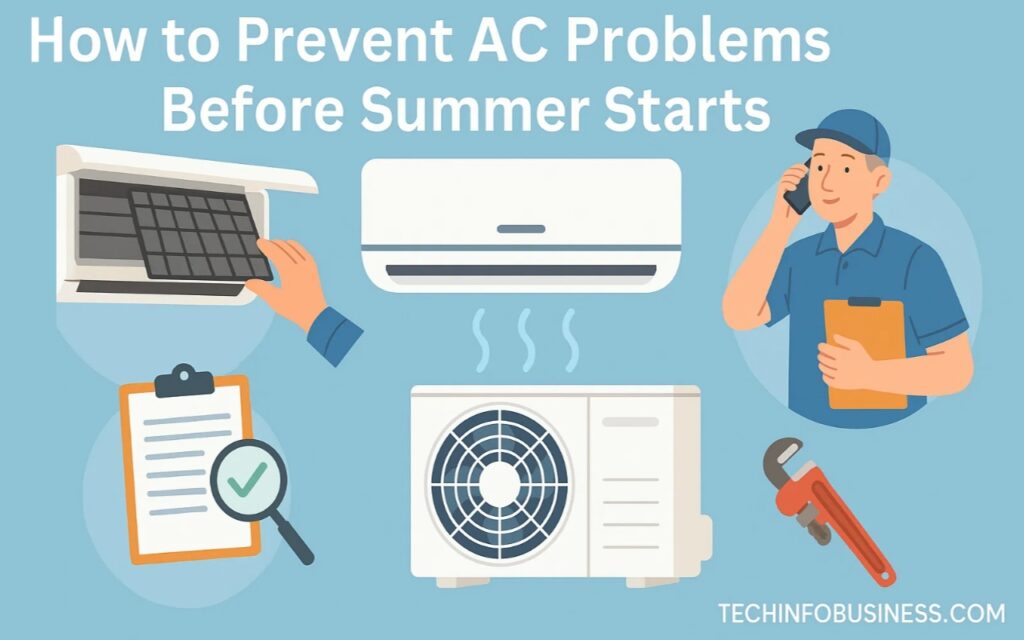As temperatures rise, homeowners rely on air conditioning to stay cool. Few things are more frustrating than finding your AC isn’t working when you need it most. The good news? Many common issues can be avoided with some simple prep before summer. These steps not only prevent costly breakdowns but also improve efficiency and extend your system’s lifespan. Want to avoid unexpected repairs and keep your AC ready for the heat? This guide has you covered.
Schedule a Pre-Summer Inspection
To avoid AC issues during the hottest months, schedule a professional inspection early. A technician will check for wear, test electrical components, ensure refrigerant levels are correct, and clean key parts for optimal performance. Early inspections catch minor problems—like a failing capacitor or clogged drain—before they turn into expensive repairs. Acting now can save you time, money, and hassle when the heat hits.
Replace or Clean Your Air Filters
Clogged air filters are a major cause of poor AC performance and airflow. When filters fill with dust and debris, they block air circulation, making your system work harder. This increases energy use and the risk of system failure. Most homes should replace filters every 1–3 months, or more often if you have pets or allergies. Clean filters not only boost efficiency but also improve indoor air quality—especially helpful during allergy season.
Clear Debris Around the Outdoor Unit
Your AC’s outdoor condenser releases heat from your home. Over fall and winter, leaves, twigs, and dirt can build up around the unit and block airflow.
Make sure to:
- Remove any debris around the base
- Trim bushes or plants at least two feet from the unit
- Gently rinse the condenser coils with a garden hose (avoid using high pressure)
This small task can significantly improve performance and reduce the risk of overheating when summer is in full swing.
Check the Thermostat Settings
With summer coming, test your thermostat to ensure your cooling system is ready. Set it to “cool” and lower the temperature. If the AC doesn’t turn on or runs inconsistently, it may be a thermostat or electrical issue. Upgrading to a programmable or smart thermostat can improve efficiency by letting you schedule cooling times. Unsure about your thermostat? Contact a trusted AC repair expert in Draper for help.
Inspect and Test Air Vents
Blocked or closed vents can lead to uneven cooling throughout your home. Take time to inspect each vent and make sure:
- They are open and unobstructed
- No furniture or curtains are blocking airflow
- The airflow feels strong and consistent
If some rooms feel cooler or warmer than others, it could be a ductwork or blower motor issue. Fixing it early ensures even temperatures and better comfort in the heat.
Look and Listen for Warning Signs
Now is the perfect time to check your AC system for early warning signs of trouble. These might include:
- Unusual noises like grinding or rattling
- A musty smell when the system runs
- Ice forming on the outdoor unit
- Weak airflow or warm air blowing from vents
Catching these signs early helps prevent full system failure. Acting quickly saves homeowners money and avoids emergency service calls.
Clean and Test the Drain Line
The condensate drain line removes excess moisture from your air conditioner but can clog with algae and mold over time. This can cause water leaks, musty odors, and water damage. To avoid issues, flush the drain line with vinegar and warm water before summer. If your system shuts off unexpectedly or you see water pooling around the unit, it may be a sign of a clog that needs professional help.
Conclusion
Summer puts your AC to the test, but a little prep can help you avoid issues. Steps like cleaning filters, checking components, and scheduling maintenance keep your home cool and efficient. If you notice anything off during your spring tune-up, don’t wait—get it fixed before summer’s peak. Reliable technicians can quickly resolve minor problems before they become major. Stay cool with proactive care.



